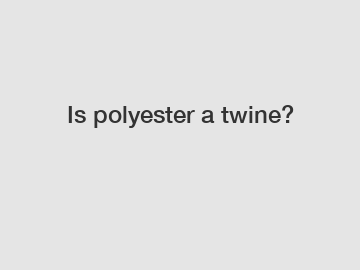Is polyester a twine?
Is polyester a twine? The answer is no. Polyester is not twine, but rather a synthetic fiber that is commonly used in the production of various products such as clothing, upholstery, and packaging materials. This conclusion can be derived from a thorough examination of the characteristics and uses of polyester, as well as its distinct differences from twine.
Polyester is a type of polymer that is created through a chemical process called polymerization. It is made from synthetic fibers that are derived from petroleum, coal, or natural gas. Twine, on the other hand, is a strong cord made from two or more strands of natural or synthetic fibers twisted together.
The primary purpose of polyester is to provide a durable, lightweight, and wrinkle-resistant material that is suitable for a wide range of applications. It is known for its excellent strength, elasticity, and resistance to abrasion, which makes it ideal for use in the production of clothing and other fabric-based products. Twine, on the other hand, is typically used for binding, packaging, and other tasks that require a strong and versatile cord.

In terms of appearance and texture, polyester is smooth and has a slightly shiny finish. It can be dyed into a variety of vibrant colors and can be woven into different fabric patterns. Twine, on the other hand, has a rougher texture and is usually only available in natural or earthy tones.
The differences between polyester and twine also extend to their respective uses and applications. Polyester is widely used in the fashion industry for the production of clothing items such as dresses, shirts, and pants. It is also used in the manufacturing of home textiles, such as curtains, bedding, and upholstery. In contrast, twine is commonly utilized in household tasks such as gardening, bundling items, or for crafting purposes.
The distinction between polyester and twine carries significant implications for manufacturers and consumers alike. Knowing the differences can help manufacturers select the appropriate materials for their products, ensuring optimal performance and durability. For consumers, understanding the characteristics of polyester and twine can guide purchasing decisions, enabling them to choose the most suitable products for their specific needs.
In conclusion, polyester is not twine. By examining the characteristics, uses, and differences between these two materials, it is evident that polyester is a versatile synthetic fiber used in the production of various products. Understanding the distinction between these materials is essential for both manufacturers and consumers to make informed decisions and achieve desirable outcomes in their respective industries and personal preferences.
Want more information on Plaited Rope, Polyester Straps, Twisted Rope for Marine Use? Feel free to contact us.
294
0
0

Comments
All Comments (0)